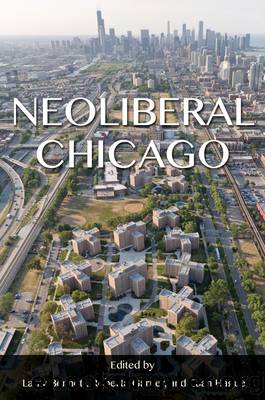Neoliberal Chicago by Larry Bennett; Roberta Garner; Euan Hague

Author:Larry Bennett; Roberta Garner; Euan Hague
Language: eng
Format: epub
ISBN: 9780252099038
Publisher: University of Illinois Press
Published: 2016-08-15T00:00:00+00:00
Box 6.1: Norfolk Southern and Englewood
In the early 2000s, Englewood residents noticed something unusual happening in their South Side Chicago neighborhood: buildings were being demolished. The community was no stranger to demolitions of wooden-frame and derelict buildings, but their sense was that a new class of property was being targeted, including corner stores and solid brick homes. Rumors were that a nearby community college needed a residential campus, that a homebuilder was redeveloping the neighborhood, or that the area was being cleared in anticipation of the city winning its Olympic bid.
In September 2011, the transportation company Norfolk Southern addressed the rumors with a public meeting that announced its proposed expansion into the neighborhood. Hundreds of families would be displaced and approximately eleven square blocks, including a small public housing project, would be razed in order to significantly enlarge the companyâs intermodal freight yard located just north of the neighborhood.
The expansion of the yard, which facilitates the movement of shipping containers between trucks and trains, was fueled by the dramatic expansion of intermodal shipping-container traffic over the last thirty years. Transportation companies have invested billions of dollars to meet this changing system. These investments have often been sited on the edge of urban centers in order to avoid the notorious delays caused by urban rail networks. In this case, Norfolk Southern is expanding its Chicago yards alongside publicly funded rail infrastructure projects designed to reduce rail traffic congestion in the city.
While no direct city funding is scheduled to support the project, Mayor Rahm Emanuelâs administration supports the rail expansion and has urged the Chicago City Council and relevant administrative boards to support the project through the sale of city-owned lots, tax increment financing modifications, and other changes. To that end, one of the mayorâs press releases on the expansion states that âin reinforcing Chicagoâs transportation infrastructure, this project will help local manufacturers, distributors, and other companies that depend on cost-effective and convenient options to ship and receive goods.â Mayor Emanuel asserted in particular that this âmeans more efficiency for local businesses and more jobs for area residents.â
As with other major resident relocation programs, including the recent elimination of nearly all of the cityâs high-rise public housing, concerns abound regarding the location of displaced residents. Norfolk Southern and, when relevant, the Chicago Housing Authority have provided moving assistance for neighborhood residents. Still, many residents worry about their reception in new neighborhoods and the evaporation of their previous support networks. No significant group has arisen to reduce the negative effects of displacement, although a local environmental coalition won some concessions to protect those who will remain in the shadow of the expanded yard.
Download
This site does not store any files on its server. We only index and link to content provided by other sites. Please contact the content providers to delete copyright contents if any and email us, we'll remove relevant links or contents immediately.
The Secret History by Donna Tartt(18179)
The Social Justice Warrior Handbook by Lisa De Pasquale(11956)
Thirteen Reasons Why by Jay Asher(8459)
This Is How You Lose Her by Junot Diaz(6445)
Weapons of Math Destruction by Cathy O'Neil(5839)
Zero to One by Peter Thiel(5497)
Beartown by Fredrik Backman(5367)
The Myth of the Strong Leader by Archie Brown(5242)
The Fire Next Time by James Baldwin(5023)
How Democracies Die by Steven Levitsky & Daniel Ziblatt(4965)
Promise Me, Dad by Joe Biden(4910)
Stone's Rules by Roger Stone(4865)
100 Deadly Skills by Clint Emerson(4694)
A Higher Loyalty: Truth, Lies, and Leadership by James Comey(4554)
Rise and Kill First by Ronen Bergman(4547)
Secrecy World by Jake Bernstein(4392)
The David Icke Guide to the Global Conspiracy (and how to end it) by David Icke(4385)
The Farm by Tom Rob Smith(4328)
The Doomsday Machine by Daniel Ellsberg(4249)
